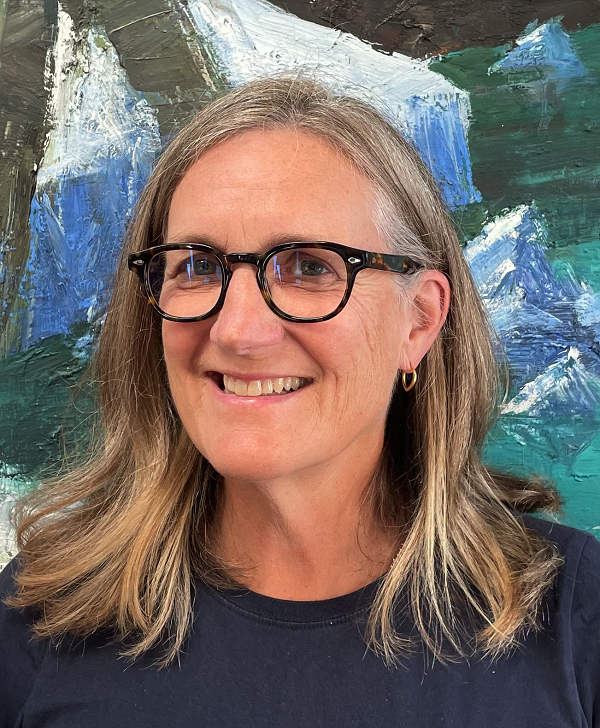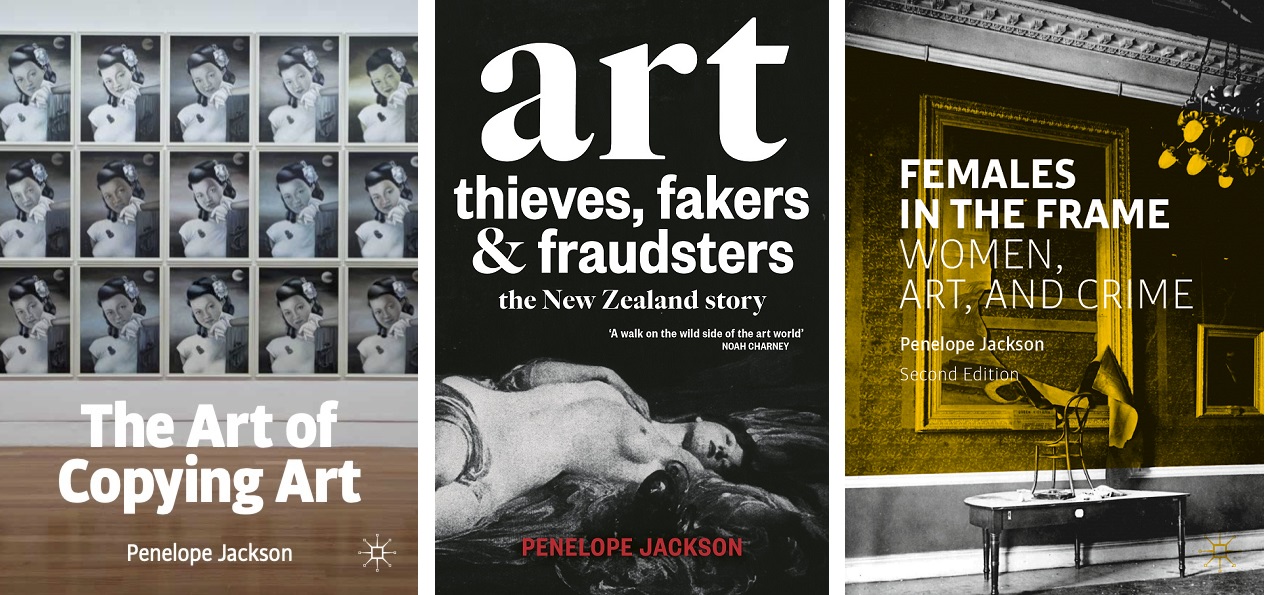
Dive deeper into the art world
Massey alumna Penelope Jackson has been awarded a member of the New Zealand Order of Merit in the 2023 New Year Honours list for services to art crime research and visual arts. “I’m humbled by the award. It’s a real honour. In terms of art crime research, this is a great acknowledgment of the seriousness of art crime studies,” Penelope says.
A wide range of learning fields
Penelope, who is based in Tauranga, is an art historian, writer, and curator having published creative non-fiction works, academic articles, and short stories; she is a founding trustee and chair of the New Zealand Art Crime Research Trust. Throughout her impressive career, she has also been a director and curator of the Tauranga Art Gallery.
Growing up in a creative household, Penelope’s mother was an exceptional spinner, knitter, and weaver – her handwoven silk scarves were given as gifts by the New Zealand government to dignitaries on official international tours. In the last year of secondary school, Penelope knew she wanted to study art history. And she did – initially, gaining a bachelor’s degree in art history at the University of Canterbury and then a diploma from the University of Canterbury’s Teacher’s College.
Having studied while living in Tauranga with her young family for a few years, a great passion for exploring extensive knowledge drove Penelope to look further, and Massey was the answer! Penelope enrolled at Massey the day her son Harry Jackson, who is now also a Massey alumnus, was born. She studied English and Classical Studies papers for a graduate diploma. “It was Massey that gave me the confidence to get back into study,” Penelope says.
A life-changing decision
After a stint in secondary school teaching art history and classical studies, Penelope made a life-changing decision – moving into public art gallery roles – first as an educator, then as curator, and later as a director.
“It was a big decision and a big drop in salary, but in my heart, that was where I wanted to be.” Penelope says her advice for those who have difficulty making career choices is, “Do what feels right. Nothing is set in concrete; you can change direction until you find what’s best for you. Don’t be afraid to be adventurous and try new things. You learn so much along the way.”
Stepping into a museum and art gallery context, Penelope started her new journey at the Robert McDougall Art Gallery (now the Christchurch Art Gallery). She was curator of the Tauranga Art Gallery from 2003 to 2010, playing an essential role in setting up the public gallery that opened in 2007. From 2010 she took on the gallery’s director role while also staying on as curator.
As an art historian, one of her first jobs was to scope the artists who had worked in the region or made images of the region. “It was very empowering, and some wonderful finds later turned into exhibitions.”
During this time, Penelope curated Corrugations: The Art of Jeff Thomson, a survey exhibition of New Zealand sculptor Jeff Thomson. It toured the country and achieved great success, and in 2014 it won a Museums Aotearoa Award for Best Exhibition.
Penelope has also curated three exhibitions of Dame Lynley Dodd’s work which toured to 23 venues across New Zealand and Australia. Another artist’s work that Penelope spent years studying is Edward Bullmore. Originally from Southland, Bullmore was an incredible artist ahead of his time in many ways for New Zealand audiences, when he returned from a decade in London in 1969. His work features in confronting Stanley Kubrick film A Clockwork Orange. Penelope curated a major exhibition of Bullmore’s work in 2008 which toured to galleries in Auckland and Southland. Through the engagement with Bullmore’s oeuvre, Penelope came to study art crime within a New Zealand context.

A combination of art crime research and writing
Aiming to concentrate on art crime research, Penelope left the Tauranga Art Gallery in 2015. She acted as a founding trustee of the New Zealand Art Crime Research Trust, which aims to raise awareness of criminal activity in the market and give people the opportunity at its annual symposia to present cases, findings, and research.
“I realised there was a catalogue of art crimes in New Zealand, but no one had looked at them or presented them in a book. Writing about art crime is about presenting new cases and content. I believe art crimes should be mainstreamed into our art history narratives.”
To Penelope, exploring the motivations for committing art crimes is intriguing. She’s authored several books on art crime, including Art thieves, fakers & fraudsters: The New Zealand Story (2016). At the end of this book, she realised how male-centric it was and she was inspired to research the role of women and art crime, later told in Females in the Frame: Women, Art, and Crime (2019).
One of the common threads in these two books was the making, exhibiting, and selling of copies of authentic artworks, which formed the foundation of Penelope’s latest book, The Art of Copying Art (2022). She decided to look at copies as a genre in their own right, and the book assesses the role and significance of copies.
“Copies are made for various reasons but are often considered the poor relatives of authentic artworks. However, copies play important roles. For instance, the paintings you see in movies like The Duke, The Girl with the Pearl Earring, The Goldfinch, etc., all contain copies. Not only that, but copies can also be used to substitute vulnerable or missing artworks,” Penelope adds.
Art crime is a fascinating subject. But why?
“I got excited about each of these areas as they were relatively untapped areas of research, and therefore, I feel like I’ve added something to the literature. For as long as art has existed, crimes have been committed involving artworks. However, these are very rarely part of the narratives. It’s important to redress this void.”
A new chapter in 2023
When she isn’t researching art crime or curating exhibitions, Penelope enjoys reading and writing fictional short stories inspired mainly by real-life events or people.
“A couple of years ago, my husband accidentally gave himself an electric shock and got thrown off the step ladder. He was fine, but it gave me a perfect ending for a story I went on to write! Sometimes it might just be something I’ve overheard about an aspect of family history that inspires me to write.”
In 2020, Penelope was awarded the University of Auckland’s Michael King Writers Centre Residency, and her short stories have been published in anthologies.
Scoping art crime book number four launches Penelope’s 2023. “The ‘Hunt’ is important to me. I’m currently scoping material for another book. There are so many gaps in the publications about art crime, so finding new avenues to pursue isn’t difficult.”